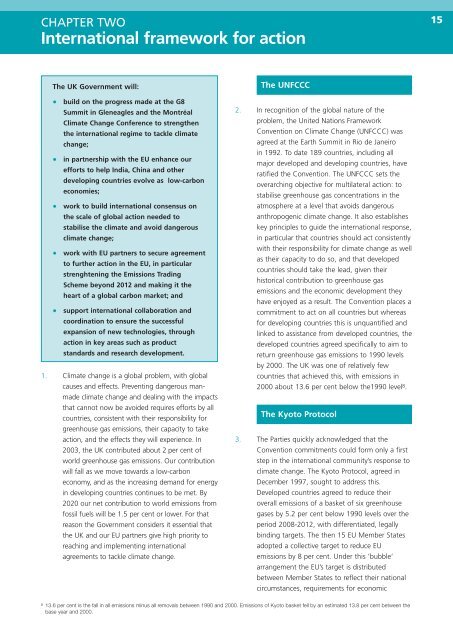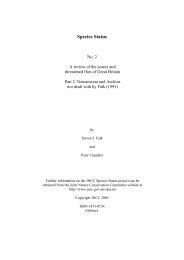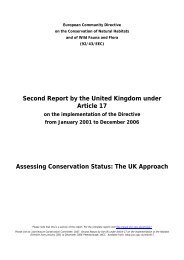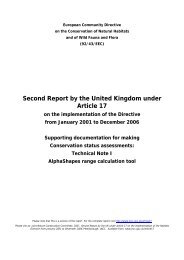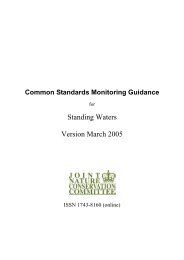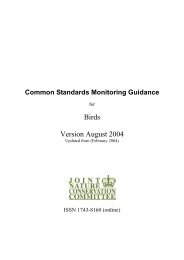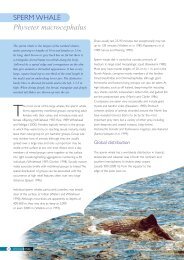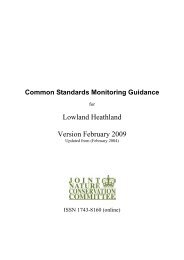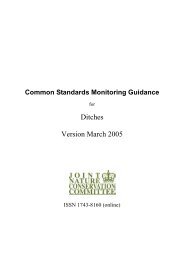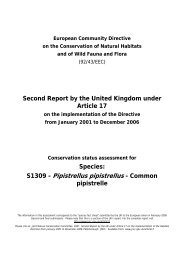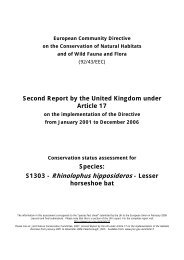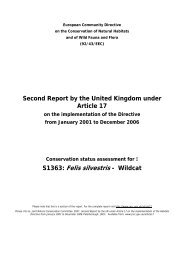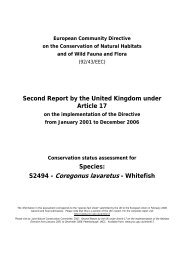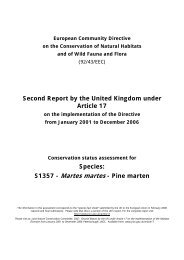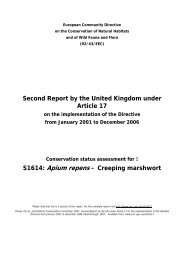UK Climate Change Programme 2006 - JNCC - Defra
UK Climate Change Programme 2006 - JNCC - Defra
UK Climate Change Programme 2006 - JNCC - Defra
You also want an ePaper? Increase the reach of your titles
YUMPU automatically turns print PDFs into web optimized ePapers that Google loves.
CHAPTER CHAPTER TWO<br />
International Title framework for action<br />
15<br />
The <strong>UK</strong> Government will:<br />
• build on the progress made at the G8<br />
Summit in Gleneagles and the Montréal<br />
<strong>Climate</strong> <strong>Change</strong> Conference to strengthen<br />
the international regime to tackle climate<br />
change;<br />
• in partnership with the EU enhance our<br />
efforts to help India, China and other<br />
developing countries evolve as low-carbon<br />
economies;<br />
• work to build international consensus on<br />
the scale of global action needed to<br />
stabilise the climate and avoid dangerous<br />
climate change;<br />
• work with EU partners to secure agreement<br />
to further action in the EU, in particular<br />
strenghtening the Emissions Trading<br />
Scheme beyond 2012 and making it the<br />
heart of a global carbon market; and<br />
• support international collaboration and<br />
coordination to ensure the successful<br />
expansion of new technologies, through<br />
action in key areas such as product<br />
standards and research development.<br />
1. <strong>Climate</strong> change is a global problem, with global<br />
causes and effects. Preventing dangerous manmade<br />
climate change and dealing with the impacts<br />
that cannot now be avoided requires efforts by all<br />
countries, consistent with their responsibility for<br />
greenhouse gas emissions, their capacity to take<br />
action, and the effects they will experience. In<br />
2003, the <strong>UK</strong> contributed about 2 per cent of<br />
world greenhouse gas emissions. Our contribution<br />
will fall as we move towards a low-carbon<br />
economy, and as the increasing demand for energy<br />
in developing countries continues to be met. By<br />
2020 our net contribution to world emissions from<br />
fossil fuels will be 1.5 per cent or lower. For that<br />
reason the Government considers it essential that<br />
the <strong>UK</strong> and our EU partners give high priority to<br />
reaching and implementing international<br />
agreements to tackle climate change.<br />
The UNFCCC<br />
2. In recognition of the global nature of the<br />
problem, the United Nations Framework<br />
Convention on <strong>Climate</strong> <strong>Change</strong> (UNFCCC) was<br />
agreed at the Earth Summit in Rio de Janeiro<br />
in 1992. To date 189 countries, including all<br />
major developed and developing countries, have<br />
ratified the Convention. The UNFCCC sets the<br />
overarching objective for multilateral action: to<br />
stabilise greenhouse gas concentrations in the<br />
atmosphere at a level that avoids dangerous<br />
anthropogenic climate change. It also establishes<br />
key principles to guide the international response,<br />
in particular that countries should act consistently<br />
with their responsibility for climate change as well<br />
as their capacity to do so, and that developed<br />
countries should take the lead, given their<br />
historical contribution to greenhouse gas<br />
emissions and the economic development they<br />
have enjoyed as a result. The Convention places a<br />
commitment to act on all countries but whereas<br />
for developing countries this is unquantified and<br />
linked to assistance from developed countries, the<br />
developed countries agreed specifically to aim to<br />
return greenhouse gas emissions to 1990 levels<br />
by 2000. The <strong>UK</strong> was one of relatively few<br />
countries that achieved this, with emissions in<br />
2000 about 13.6 per cent below the1990 level 8 .<br />
The Kyoto Protocol<br />
3. The Parties quickly acknowledged that the<br />
Convention commitments could form only a first<br />
step in the international community’s response to<br />
climate change. The Kyoto Protocol, agreed in<br />
December 1997, sought to address this.<br />
Developed countries agreed to reduce their<br />
overall emissions of a basket of six greenhouse<br />
gases by 5.2 per cent below 1990 levels over the<br />
period 2008-2012, with differentiated, legally<br />
binding targets. The then 15 EU Member States<br />
adopted a collective target to reduce EU<br />
emissions by 8 per cent. Under this ‘bubble’<br />
arrangement the EU’s target is distributed<br />
between Member States to reflect their national<br />
circumstances, requirements for economic<br />
8 13.6 per cent is the fall in all emissions minus all removals between 1990 and 2000. Emissions of Kyoto basket fell by an estimated 13.8 per cent between the<br />
base year and 2000.


